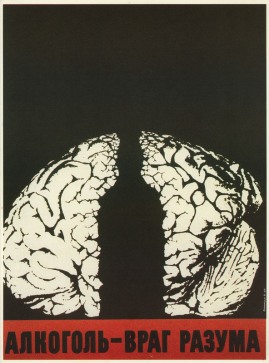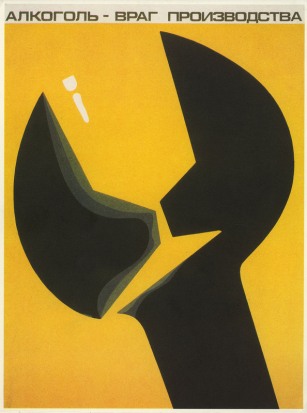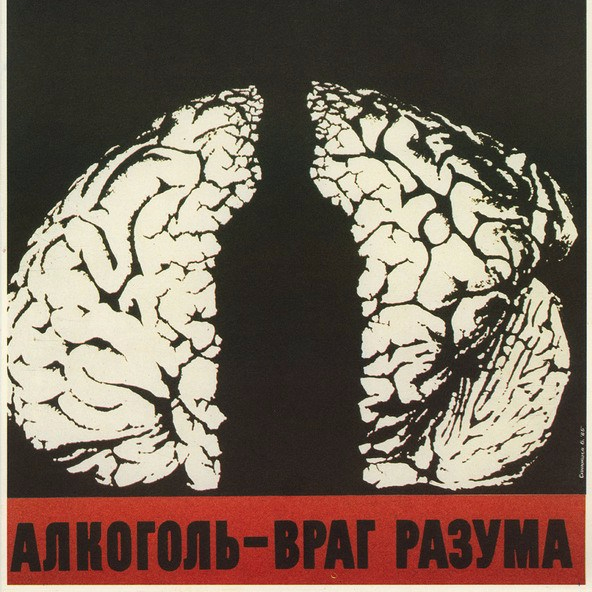
It’s common knowledge that Vodka is a Russian specialty, and the Russian’s knew how to have a good time no matter the time of day or reason to celebrate. Blogger Katelin writes in her post ‘War on…Alcohol?’ about the Soviet Union’s struggle with their population that was showing some unfortunate signs and side effects of alcoholism, such as Fetal Infant Syndrome (FES), birth defects, and the statistical double-ing of alcohol consumption in the 1970s.
Skip ahead 10 years and the Soviet Union is facing some sobering (no pun intended) statistics in the late 1980s. James von Geldern writes of Gorbechev’s big push for sobriety in his essay ‘Anti-alcohol Campaign’ on the website ’17 Moments in Soviet History’:
“In May 1985, less than two months after becoming General Secretary of the Communist Party, Mikhail Gorbachev launched a campaign against alcohol abuse, backing it up with a series of measures to reduce alcohol production and sales. These included limiting the kinds of shops permitted to sell alcohol, closing many vodka distilleries and destroying vineyards in the wine-producing republics of Moldavia, Armenia and Georgia, and banning the sale of alcohol in restaurants before two o’clock in the afternoon.”

By the late 1980s, everyone knew that Gorbachev and his party meant business when it came to the sobriety of the Soviet Union. Heck, there was even a Anti-alcohol song created for the campaign! It’s basically the Soviet Rendition of Katy’s Perry’s ‘T.G.I.F. (Last Friday Night)”. I’m not certain whether that song purely invoked laughter among the populations or actually helped turn people away from their beloved booze.
As seen in the ‘Soviet Anti-Alcohol Posters Gallery’, posters were put up with very bold and vivid images of the consequences of alcoholism. I’ve pictured a few of these posters within this blog post, but I noted that almost all of them have a particular tendency to characterize the substance as the worst possible thing one could ever consume. The power of state-ordered propaganda, especially in a society where free press was a far cry from the west, was very clear as to what the government wished to see in terms of alcohol statistics in the next few years.
Once again, enter the problem with state-mandated statistical results in the USSR. Just like in Stalin’s five-year plans decades earlier, the jury is out as to whether Gorbachev’s campaign really helped the population to the extent that statistics show. An article in The Current Digest of the Russian Press titled “How Much is Sobriety Costing Us” published in 1988 stated:
“By all indications, we’re drinking about as much today as in 1985. Statistics indicate that while vodka sales fell from 2.5 billion to 1.2 billion liters over the past two years, sugar sales jumped by 1.5 billion kilograms. In the first five months of this year, 2.7 million people, including 270,000 home brewers, were penalized for alcohol-related violations.”
As the state carried out the campaign, the population made up for it by brewing their own alcohol instead. The statistics are notable, however it doesn’t take into account what people who are addicted to alcohol will go through to acquire more of it. The article continues to describe the subsequent sugar shortage seen in the late 1980s because of the campaign:
“By continuing to pressure people so crudely, we risk making some situations critical. Sugar reserves are now so low that the Ministry of Trade fears we will be forced to buy another 1.8 metric tons of sugar abroad, which will cost the nation $1 billion dollars.”
Though alcoholism was rampant throughout the Soviet Union, I wonder what effects were tied to other sorts of addictions at this time. What about smoking, or the effects of nuclear power and radioactive materials that leaked into the environment? Could the Soviets have become reliant on sugar and sugar alcohols amidst the campaign, causing other health issues? Maybe dental problems?
Sources:
https://katelingamble4soviethist.wordpress.com/2017/04/02/war-on-alcohol/
http://soviethistory.msu.edu/1985-2/anti-alcohol-campaign/
https://dlib.eastview.com/browse/doc/13549293
Image Sources:
“Alcohol, Enemy of Reason” – https://tululuka.net/alco/intellect/
“Alcohol, The Enemy of Production” – https://tululuka.net/alco/enemy/


First of all, thanks for referencing my blog! I definitely see some parallels between Gorbachev’s anti-alcohol campaigns and the ones from the 1970s. I agree with you, it is interesting to see how they emphasize that alcohol was the worst thing for the prosperity of the state. I also really like the additional anti-alcohol posters! I’m glad you also incorporated the economic effects this had on the Soviet Union!
LikeLiked by 1 person
I liked your comment on the “power of state-ordered propaganda.” It is a good thought and makes you wonder how true the statistics of the articles are, or if it’s just the government saying what they think needs to be said. I also liked how you used the articles in your post, it is good to show what the press was saying, despite how true or untrue it was at the time.
LikeLike
I really liked the fact that you noted that the population began to make up for the alcohol shortage. So much so that alcohol sales dropped by over 1 billion liters. I also thought the same thing regarding statistics. If freedom of the press was far from free, it would be interesting to see if statistics that were released had also been tampered with.
LikeLike
Great post! I wrote about the same topic: https://mouattarablog.wordpress.com/2017/05/01/shots-of-death-or-vodka/comment-page-1/#comment-36. I like the Katy Perry reference and find that really cool. It’s not something that I came across in m y research.
LikeLiked by 2 people
Thank you! I read your post as well, and I thought it was very well done. I could tell that we had different focuses for our research, and I really appreciated that you looked more in-depth on consumption statistics. It gave me some insight for improving this post too!
LikeLike
It’s interesting to see the parallels here with the other attempts by the government to stamp out alcohol abuse. Abuse of alcohol remained a problem for the Soviets, as it did in the US during prohibition. It seems that despite many cultural and political differences people will do whatever it takes to get their alcohol, whether it’s America in Prohibition or the USSR and the sugar shortages.
LikeLike
The Gorbachev campaign was definitely comprehensive in its efforts against alcohol, as evident by propaganda posters, music, and the destruction of distilleries/vineyards. Your discussion of the alcohol statistics was interesting, especially the large increase in sugar sales that caused a shortage.
LikeLike
I think it’s interesting to consider to drastic measures that the government took to negatively advertise alcohol after it had been such a staple to Russian society. I thought your Katy Perry reference was very cool, and you incorporated a lot of interesting info/propaganda that made your post a really enjoyable read!
LikeLike
I liked your post because, compared to a lot of what we read about Soviet politics, this was the government’s attempt inform the people of the threat of drinking too much alcohol and then doing something about it. You show that this did have a lot of backlash, like its effect on businesses and people illegally finding ways to get alcohol, but I like your propaganda posters, it shows how the press tried to overcome the negativity of the ban.
LikeLike
You’ve got great comments here, so I’ll just focus on the sugar issue: People used it to make moonshine / homebrew when the state clamped down on vodka.
LikeLike
After reading some of the other blog posts and the great comments above I made that connection. I’m looking forward to adding that to my post. The sugar shortage is a marvel to me, as I can’t imagine how much sugar the USSR must have gone through during the campaign to have a state shortage. That illegal Soviet hooch must have been delicious!
LikeLiked by 1 person
Arrestingly strong – yes. Delicious, not so much.
LikeLike
I found it interesting how the citizens just starting making their own alcohol to compensate for the lack of it in the market. There is an obvious parallel there to the prohibition in the U.S. and the production of Moonshine as a result. Apparently, the need for alcohol even when it is difficult to get is a shared attribute of U.S. and Soviet citizens of the time.
LikeLike
This post was very fun to read, you did a great job. I find it hard to believe that the Russians would ban alcohol, it seemed central to their national identity! Similar to the prohibition here in the states, people always find a way to get their alcohol. That says a lot about how much people want it. You did a good job referencing other sources and other blogs, well done.
LikeLike